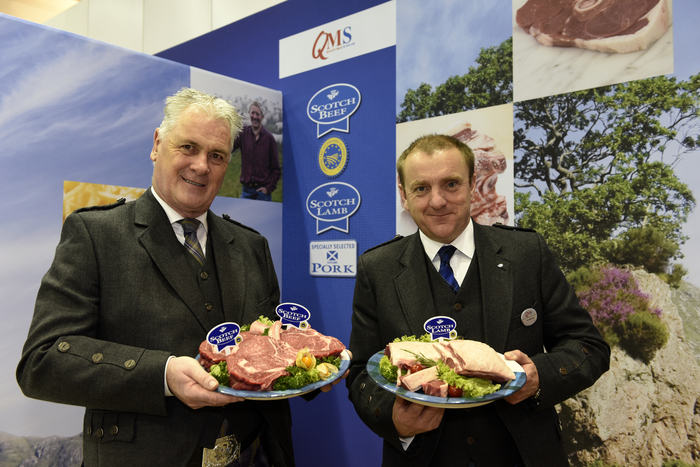The value of exports of beef and lamb from Scotland has increased to over £80 million in the past year, according to the results of the annual exporters’ survey conducted by Quality Meat Scotland (QMS).
Speaking at the Anuga in Cologne, one of the world’s largest food fairs Jim McLaren, Chairman of QMS, revealed that Scotland’s exports of red meat increased in value by 9% (4.3% by volume) in the year ending August 2017.
During a reception held on the QMS stand, Mr McLaren said the figures should send a positive signal to Scottish exporters and those working in the wider red meat industry in Scotland.
“This strengthening of export demand is a very clear indication that, despite the on-going challenges of the global economy and the uncertainty generated by the Brexit negotiation process, overseas demand for Scotch Beef PGI and Scotch Lamb PGI remains strong,” Mr McLaren said.
“We continue to focus on strengthening our relationships with our much-valued, long-established overseas customers who recognise all that sets our beef and lamb apart – from our quality assurance and animal welfare to our sustainability message. We will also continue to seek out and welcome new export opportunities,” added Mr McLaren.
While the greatest volume of sales of beef and lamb from Scotland, almost 89%, was the result of trade with other EU countries, the biggest driver for growth was in exports to third countries.
Strong examples of this, said Mr McLaren, were Hong Kong, Macau and Singapore, where four Scottish companies have been exporting during the past year.
Within the EU, the biggest markets for beef from Scotland remain France and Italy, according to the QMS figures. Looking at the countries which pay the greatest premium for beef from Scotland, Belgium leads the way in the EU, with Norway and Switzerland paying the most outwith the EU.
Looking only at beef from Scotland, the value of exports increased by over 12% year-on-year, with the volume increase of 3.4%, a clear indication of the influence of currency.
The biggest increase in export trade of beef from Scotland was to Germany and the Nordics which have increased by 53% and 46% respectively.
Mr McLaren said it was vital that the Scottish industry continues to meet the demands of overseas markets for high quality produce. However, he also drew attention to the importance of export markets in terms of optimising returns for the entire carcase.
“While there is demand from overseas customers for the very top end of quality products from Scotland there is also encouraging volume demand from overseas markets for fifth quarter and lower value products. This is important in terms of optimising returns for the whole carcase,” said Mr McLaren.
QMS’s export strategy in recent years has focused on developing opportunities in Germany and the Nordics, along with the existing well-established target markets of France, Italy and the Benelux.


